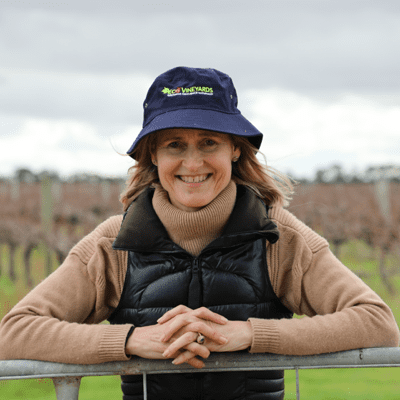Tell us in a few sentences about your experience as a viticulturist, how did you arrive here?
The vines of Tolderol were first planted in 1997 to satisfy the family’s thirsty drinking habits! My late father-in-law Mick led the charge here. Brother-in-law Ack (who lives on the property and manages the vineyard) has many talents – his sense of humour being at the fore. Whilst doing tractor work, he decided the ‘breezes’ off the nearby Lake Alexandrina were more of a howling gale and thus our wine label of Howlin’ Gale Wines was born. During his many hours on the tractor, Ack conjures up topical Howlin’ Gale poems (sometimes political and controversial!) which feature on each vintage label.
Why did you decide to apply to be an EcoGrower, was there something specific that influenced your decision and/or had you attended a previous EcoVineyards session?
I have always been passionate about nature and revegetation. A good friend of ours has recently become involved in your program and this was the trigger for us to apply to be an EcoGrower.
Has there been a defining moment or catalyst for you to move towards more ecologically driven viticultural practices?
This season in particular has thrown growers additional challenges. If we can promote the status of our vineyard as being a sustainable practicing vineyard, we hope to lift the profile of our vineyard and fruit in the future. Also, we see the project as starting our path of being more environmentally sustainable.
Can you provide a brief overview of your project ideas, and what you wish to achieve over the 3 years and why is this important to you?
Initially, we plan to revegetate the eastern side of the vineyard, as this is clear and fenced and we can tap into irrigation from the vineyard. Following your advice, we will spray and prepare the area, install drip irrigation and then (hopefully) plant tube stock this winter. We need to remove some feral Athel pines on the western side of the vineyard and next year we hope to reveg this area. Following the success of both these projects, we hope to then revegetate 4 acres (which has water access) south of the vineyard.
Are you just starting to learn, or have you been enhancing biodiversity on your property and is this an extension of what you are currently doing?
I did a horticultural course at TAFE some time ago, so I have a basic knowledge of plants, soil composition etc. I have also volunteered with the Friends of Waite Conservation Group in feral olive control and native revegetation. I am passionate about native revegetation to help with re-establishing insect/bird habitats and all the other benefits of replenishing our biodiversity, i.e. building soil quality, drawing down carbon, reducing pests etc. My brother and sister-in-law have done some revegetation around their house on Tolderol with mixed success. I will take advice from them and Jim Natt. I have had a conversation with Jim, as he has done extensive work on revegetation on his property nearby, with huge success.
Tell us about your hidden superpowers, something that others don’t know about you or a practice you would like to champion?
I have done some work in the waste reduction space. I have worked with a predominant golf club in Adelaide to introduce a 3-bin system to divert compostables from landfill. Our 3 bins are general waste, recycling and compostables. Along with on course bins, we are diverting kitchen scraps and hence, have diverted tonnes of green waste from landfill. I am currently looking at taking this to other golf clubs.
Where do you see grape growing in the future, do you feel there is an urgency to change current practices? If so, why?
I feel there will be a shift away from the reliance on synthetic fertilisers and fungicides to control disease and an increased awareness towards environmentally sustainable practices. Education and assistance through projects such as yours are the key to future success in this space.
What else would you like to share with the broader EcoVineyards community, what gets you excited about the future?
I am excited to know projects such as yours are available to growers. We can all learn and improve our practices and strive towards more environmentally sustainable techniques.

